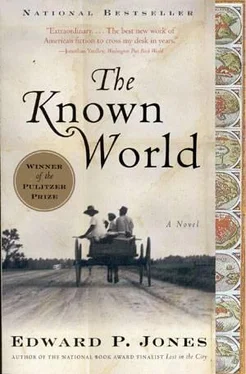“Best get ready,” Skiffington said. “We goin.”
“Where?”
“Out to get that runaway Moses.” He was moving as gingerly as he could because movement upset the mess on the side of his face. He was not looking forward to the long ride, the bouncing about, but he had a sworn duty and he did not want to trust Counsel or the patrollers out there with a murderer. No doubt Augustus and Mildred had guns. He took his rifle from the rack.
By ten-thirty they were well out of the town of Manchester. It was a very hot day and they moved into what his father Carl often called “the teeth of the sun.” Counsel was chewing tobacco, a habit he had picked up in Alabama, and now and again, he would spit ahead into the dusty road to see how far the spit would skip. They didn’t talk much, and when they did, it was mostly Counsel just saying something to break the silence between them. And when he wasn’t talking or spitting into the road, he was whistling the tune which surely had dirty words to go with it.
Skiffington did say, about halfway to William Robbins’s plantation, that Counsel should try to drop the tobacco habit. He talked through clenched teeth to keep as little air as possible from getting in and knocking against the ornery nerves of the tooth.
“I’ve never seen anything wrong with it,” Counsel said, making still one more note in his mental book about the shit way his cousin saw the world. “Just a little habit that God don’t mind.”
“If you pile up enough habits,” Skiffington said, “you soon have enough for a real sin. Then you have trouble.”
The unsparing sun put a greater burden on the men and their horses and they arrived at Robbins’s about twelve-thirty, a little later than Skiffington had wanted. Robbins was not there but Mrs. Robbins and Patience her daughter made them at home. Mrs. Robbins had a dinner prepared for them. Skiffington wanted only soup, lukewarm and as close to a broth as the cook could manage. Patience said as they ate, “John, you and Counsel should just rest up here today and go out tomorrow.” Patience reminded Counsel of Belle, his wife, when she was young.
Four years and one month from that day, William Robbins would suffer a stroke. This was at a time when his wife had already turned beastly sour because she lived in a house with a man who could not love her anymore. Not satisfied with the reports about her father’s condition that she received second- and thirdhand, Dora would decide she could not wait any longer and went to her father’s plantation after he had been in his sickbed for three weeks. Her brother, Louis, told her not to go, but she had more of her father in her than he did. Neither child had ever been to the plantation before.
Patience said to Skiffington, “Stay on here through the night, John. The rest will do you both some good. And your tooth’ll thank you for the rest.”
Dabbing at his mustache with his napkin, Skiffington said to Patience, “I wish I could stay, Miss Patience, but my business will not wait.” He complimented her and Mrs. Robbins on the soup and finished the whole bowl.
That day four years later, Dora would knock on the front door of her father’s mansion and Patience, the half-sister she had never met, would open it. Behind Patience was her mother. “I would like to see Mr. Robbins, please,” Dora said, not contracting the “I would” into “I’d,” something Fern Elston would have been proud of. Dora had not ridden out on a horse and was in a green dress her father had bought in Charlottesville. She had brought herself in a carriage. Her bonnet was yellow, and the untied strings at either side of the bonnet hung down two inches or so, reminding Patience of a sunburnt face she had not seen in the mirror for many years.
Except for Dora being darker and younger, the two women were identical. Negroes would say that on the day God made Patience, he knew he wanted to make another just like her. God really didn’t want to wait for the day Robbins and Philomena would conceive Dora, so he made her right then because he knew he wouldn’t be in that same state of mind when Dora came along years later. So he made Dora and put her in the left pocket of his shirt, to be brought out when she was ready to be conceived. Being in the left pocket was necessary, Negroes said, because heaven with all those happy people could sometimes get rowdy, especially on Saturday nights.
“I have come to see Mr. Robbins,” Dora said. Patience opened the door wider. She knew almost immediately that standing before her was the only other person who loved William Robbins the way she did. She had been carrying the weight of his illness alone, and as she stood there, she felt the burden grow less and less. The servants had helped her but not because they loved her father. And her mother had stopped loving him and would not lift a finger to help.
Patience would turn to her mother and say, “Please, sweetheart, go to the East,” the daughter’s name for that part of the mansion where her mother now lived, where the mother and daughter had played hide-and-go-seek when Patience was a child. “Go to the East and I will come for you before long. Please do this for me.” Her mother left, and Patience said to Dora, “Come. Please, come.” And as a servant closed the door, both women took up their skirts and went to the West.
“Yes, John,” Mrs. Robbins said to Skiffington, “please, stay the night. Sunday is for rest.”
“I wish I could.”
After the dinner, a servant made up a horseradish poultice and Skiffington and that slave fixed it to his jaw and he and Counsel were back on the road by two-thirty.
The poultice worked for a good hour but its powers seemed to fail as the sun got lower to the horizon. “Don’t trust nigger medicine,” Counsel said. “I didn’t,” Skiffington hissed. “Just be quiet about it now.”
There was a little more than four hours before sunset when they neared on Mildred Townsend’s place. They waited many yards away, Skiffington believing he might hear something of Moses. “We might as well go on in and take him,” Counsel said. Skiffington said, “Just sit and listen.” In the end, Mildred’s dog came out to the road and barked at them and Skiffington decided to finish the job. They rode up to the house and Mildred opened her door and pointed her rifle at them.
“Come to tell me what I already know bout my husband, sheriff?” she said. “Come to tell me what God done already said.” The dog was peering from around the side of the house and every time Mildred would say something, the dog would get bold and bark twice, then wait for more words from Mildred. Finally, the dog went and stood beside Mildred.
Her rifle told Skiffington once and for all that Moses was there.
“Mildred, you know why we are here.”
“I know no such thing, Sheriff Skiffington.”
“Surrender the property,” he said, leaning on his pommel. “Just surrender the property and all of this will be over, Mildred.” He could not remember if he had ever spoken her name before and for a moment he questioned the entire day because he thought he had gotten her name wrong. Was her name really Mildred? “Just surrender him on up.”
“No more.”
“Listen to what I’m saying to you, Mildred.” He tried to remember her husband’s name, to make some connection, but he could not remember the man’s name. “I want you to surrender the property.”
“No more. No more men from here. No more men from anywhere. Not one more.”
“You just do what the sheriff says,” Counsel said. “Surrender the goddamn property, like he said.”
Skiffington turned to him. “How many times have I told you not to take the name of the Lord in vain? How many times, Counsel?” He had opened his mouth too much and the air came in and pounded the tooth’s nerves.
Читать дальше












